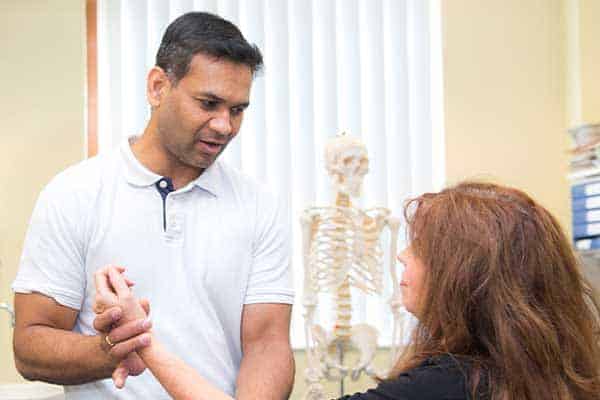A dislocation of your shoulder joint happens when the ‘ball’ at the top of your arm bone comes out of the socket that it normally sits in.
In most cases it is pushed forwards out of the socket.
This can also cause the surrounding tissues to become overstretched or torn.
What causes a shoulder dislocation?
The most likely cause of a dislocated shoulder is a sudden traumatic force, such as a collision in sport or a heavy fall onto your arm or hand.
There is another type of dislocation that happens without any apparent trauma. This can reoccur frequently and is caused by instability in the shoulder that may be a result of abnormal muscle activity, hypermobility and/or a variety of psychological factors.
What are the symptoms of a shoulder dislocation?
In the case of traumatic shoulder dislocation, the symptoms are immediately obvious after an injury. For most people:
- You experience pain around your shoulder joint.
- You lose range of movement or may not be able to move your arm at all.
For some people:
- Your shoulder may appear square instead of round.
- You may see a bulge or lump in front of your shoulder.
- Your shoulder may feel unstable when you carry out certain actions.
How is a shoulder dislocation diagnosed?
If you think you have dislocated your shoulder, go to your nearest A&E.
Never try to ‘pop’ the arm back in yourself, as this might cause further damage.
While waiting for medical help, try to support your upper arm and avoid moving it.
Once you have been assessed and examined, you will usually be sent for an x-ray to confirm the diagnosis and make sure that you have not broken any bones.
What are the treatment options for a shoulder dislocation?
In most cases, the first procedure is called reduction. This means carefully manipulating your arm back into the correct place. You will be offered painkillers before this and possibly a sedative to help you relax.
Sometimes, when you dislocate your shoulder, you also tear ligaments, tendons and other tissues. Surgery may be recommended to repair these.
In cases of only minor damage, you might be recommended to follow a programme of exercises to strengthen your shoulder, instead of having surgery.
For dislocations that have occurred without a traumatic cause, surgery is unlikely to be recommended and you will probably be referred to a physiotherapist or other specialist to develop a rehabilitation programme that is tailored to your needs.
When you go home after your shoulder has been put back in place, you will need to rest your arm in a sling for a few days. After this it will be beneficial to keep moving. Your doctor or physiotherapist will be able to advise on exercises and pain relief.
What is the prognosis (outlook) for a shoulder dislocation?
Recovering from a dislocated shoulder may take 3-4 months or more, depending on how severe it is and how effective your rehabilitation regime.
However, you should be able to resume most activities within a few weeks. Typically, you will be advised to avoid heavy lifting or contact sports until your shoulder has fully healed.
How can I prevent recurrence of a shoulder dislocation?
Shoulder dislocations can be likely to reoccur, particularly if yours was linked to causes other than a traumatic injury. Your age is also a factor.
For example if you dislocated your shoulder at a very young age due to trauma, the chances of a recurrence are very high. However, if you have had surgery and/or followed the recommended programme of exercise and rehabilitation, you will have greatly reduced the chances of dislocating your shoulder again.

How to get referred
Find out how to get referred to Practice Plus Group MSK & Diagnostics for NHS treatment.




